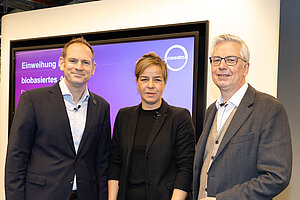The world's first pilot plant for bio-based aniline was inaugurated at the Leverkusen site at the beginning of February in the presence of prominent guests from politics and science. The plant marks a significant step towards plastics production based on plant biomass and is the result of a pioneering collaboration between Covestro and leading scientific institutions such.
The process, which makes it possible to produce aniline entirely from plants instead of crude oil, was developed by Covestro and partners and is now being tested in the pilot plant in Leverkusen. Aniline is a key chemical in the plastics industry and is used, among other things, to produce MDI, an important component of insulating foams for buildings and refrigerators.
Walter Leitner, Director at the MPI CEC and Head of the Department of Molecular Catalysis, was invited to the opening ceremony and took part in the panel discussion. His profound expertise and pioneering research in the field of chemical energy conversion provided important impulses for the conception and implementation of the innovative process. As an expert in the field of sustainable chemistry, he and his team are constantly helping to bridge the gap between academic research and industrial application. Such collaborations lead to successful results, such as the realization of the world's first pilot plant for bio-based aniline.
The inauguration ceremony was attended by North Rhine-Westphalia's Deputy Minister President Mona Neubaur, who took part in a panel discussion together with Leitner. In his remarks, Leitner emphasized the importance of partnerships between research and industry for the development of innovative technologies.
Dr. Thorsten Dreier, Chief Technology Officer at Covestro, emphasized the importance of the new process: "With our new process, we are contributing to building a circular, bio-based economy, and I am very proud that we have now succeeded in taking the leap to the next technological level."
The process for producing bio-based aniline is based on industrial biotechnology, in which a customized microorganism helps to convert industrial sugars from plants into an intermediate product through fermentation. This intermediate is then further processed into aniline with one hundred percent plant-based carbon using chemical catalysis.
The research and development of bio-based aniline continues to be supported by the German government. The Federal Ministry of Food and Agriculture is funding a follow-up project (Bio4PURDemo) by Covestro and partners, which will run until 2025 and is intended to help further advance bio-based aniline production.
The opening of the pilot plant for bio-based aniline marks a milestone on the way to a more sustainable chemical industry and underlines Germany's innovative strength in the development of environmentally friendly technologies.
For more information, read Covestro's press release here.

